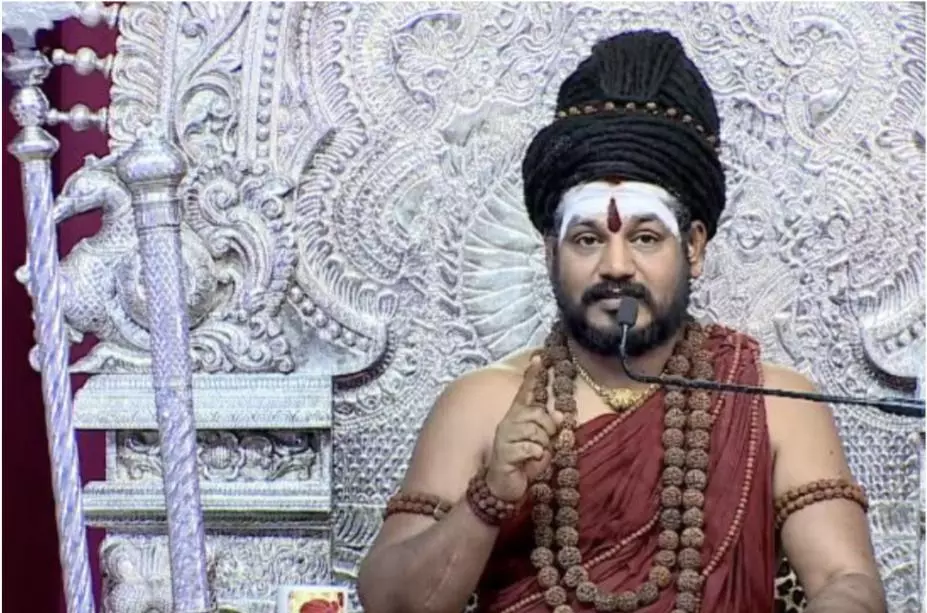
Nithyananda's United States of Kailasa: All you need to know

Nithyananda, a controversial self-styled godman accused of rape and illegal confinement of minors, has recently cropped up in the news again, as representatives from his self-proclaimed nation, the ‘United States of Kailasa’ (USK), attended a United Nations meeting last month.
In 2019, Nithyananda fled from India and surfaced a year later, asserting that he had founded his own country.
Nithyananda’s followers keep a virtual presence on social media, sharing regular updates about their self-proclaimed nation despite its lack of a physical location. While it is rumoured that Nithyananda has bought an island off the coast of Ecuador and named it “Kailasa,” there is little visual evidence to confirm this, according to BBC reports.
Also Read: ‘Kailasa holds India in high regard,’ clarifies Nithyananda’s ‘UN envoy’
Despite the lack of a physical location, the self-proclaimed country has a social media presence, with its representatives regularly posting videos and photos of their interactions, allegedly with diplomats from various nations.
Where is this fictitious country?
Numerous reports suggest that Nithyananda’s purported country is situated on one of Ecuador’s islands. However, the Ecuadorian government had informed the BBC that Nithyananda was not present in their country.
The name ‘Kailasa’ is derived from Mount Kailash, a sacred site for Hindus located in Tibet.
As per its website, Kailasa claims to have a population that includes “two billion practising Hindus”.
What is the ‘Kailasa’ movement?
As per the website of the self-proclaimed nation, ‘Kailasa’ is a movement established and led by members of the Hindu Adi Shaivite minority community from Canada, the United States, and other countries.
It claims to provide a safe haven to all practising, aspiring, or persecuted Hindus worldwide, regardless of race, gender, sect, caste, or creed, where they can freely express their spirituality, arts, and culture without interference, denigration, or violence.
Also Read: Self-styled godman Nithyananda once claimed that he was able to delay sunrise
Citizenship
USK’s Twitter account recently posted a call for applications for e-citizenship e-visas on Thursday. The self-proclaimed country also claims it has its own flag, a constitution, an economic system, a passport, and an emblem.
The website for ‘Kailasa’ lists various departments like treasury, commerce, sovereign, housing, human services and others, similar to other countries. The fictional nation claims to be the “home and refuge for the international Hindu diaspora”.
Not recognised by UN
Nithyananda, however, is facing difficulties in gaining international recognition for ‘Kailasa’. Despite posting about the country’s participation in events and meetings with authorities and governments, the United Nations has not acknowledged it as a sovereign nation.
The Montevideo Convention of 1933 outlines the criteria for a territory to be recognised as a country, which includes having a permanent population, a government, and the ability to establish diplomatic relations with other nations.
Also Read: UN dismisses Nithyananda’s “Kailasa” submissions at Geneva meetings
Nithyananda sent representatives of ‘Kailasa’ to the UN in an attempt to gain recognition on an international level, but the submissions made by Vijayapriya Nithyananda were deemed “irrelevant” by the UN and were not considered in the final outcome drafts.
Status
If a territory does not meet the criteria for being recognised as a country, it may be classified as a micronation. Micronations are entities that claim to be independent sovereign states but are not recognised by the international community or the United Nations, according to Encyclopaedia Britannica.
The Independent reported in 2019 that there were approximately 80 micronations in existence around the world. The article also provided an example of a city called Rajneeshpuram, established by another Indian spiritual leader, Rajneesh, in Oregon in the 1980s. This city had its own police force, fire department, and public transportation system.
Background of Nithyananda
At the age of 24 in 2002, he commenced his public life using the name Nithyananda. His name was bestowed upon him by deceased saint Mahavatar Babaji (1828-1895), through a mystical encounter during his period of wandering as a monk in the Himalayas. One year later, in 2003, he established his ashram, Dhyanapeetam, in Bidadi, near Bangalore in Karnataka.
Fugitive on the run
In 2019, Nithyananda fled India while he was out on bail on a rape charge. He was accused of raping a female disciple in 2010, for which he was briefly arrested and charged in court in 2018. Another complaint was filed against him for illegally confining children at his ashram in Gujarat. There is a non-bailable warrant issued against him by a sessions court in Ramanagara, adjoining Bengaluru, in the 2010 rape case.
It is unclear how Nithyananda escaped and where he is at present.
Since 2019, Nithyananda has not made any public appearances, but his sermons continue to be shared through his social media channels.

